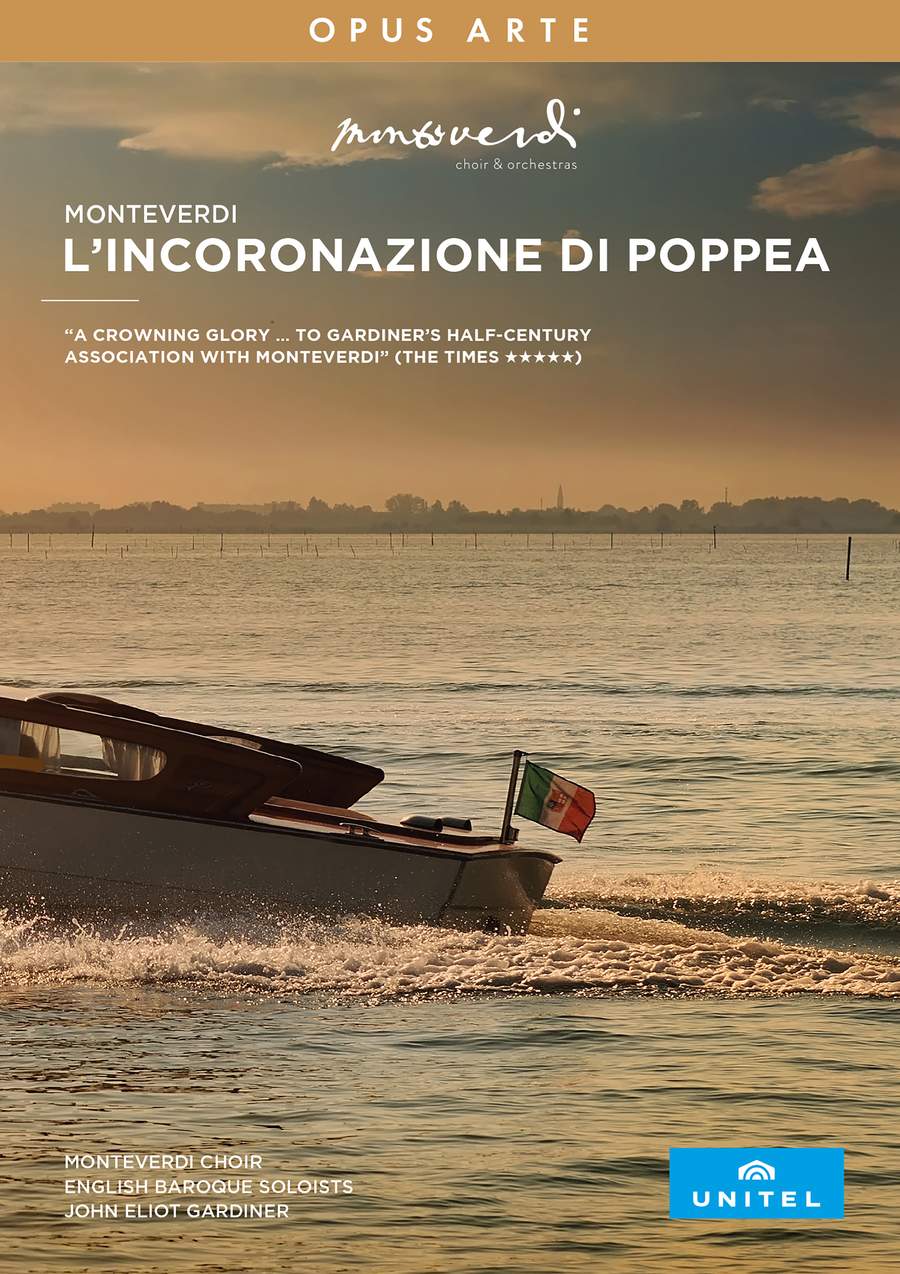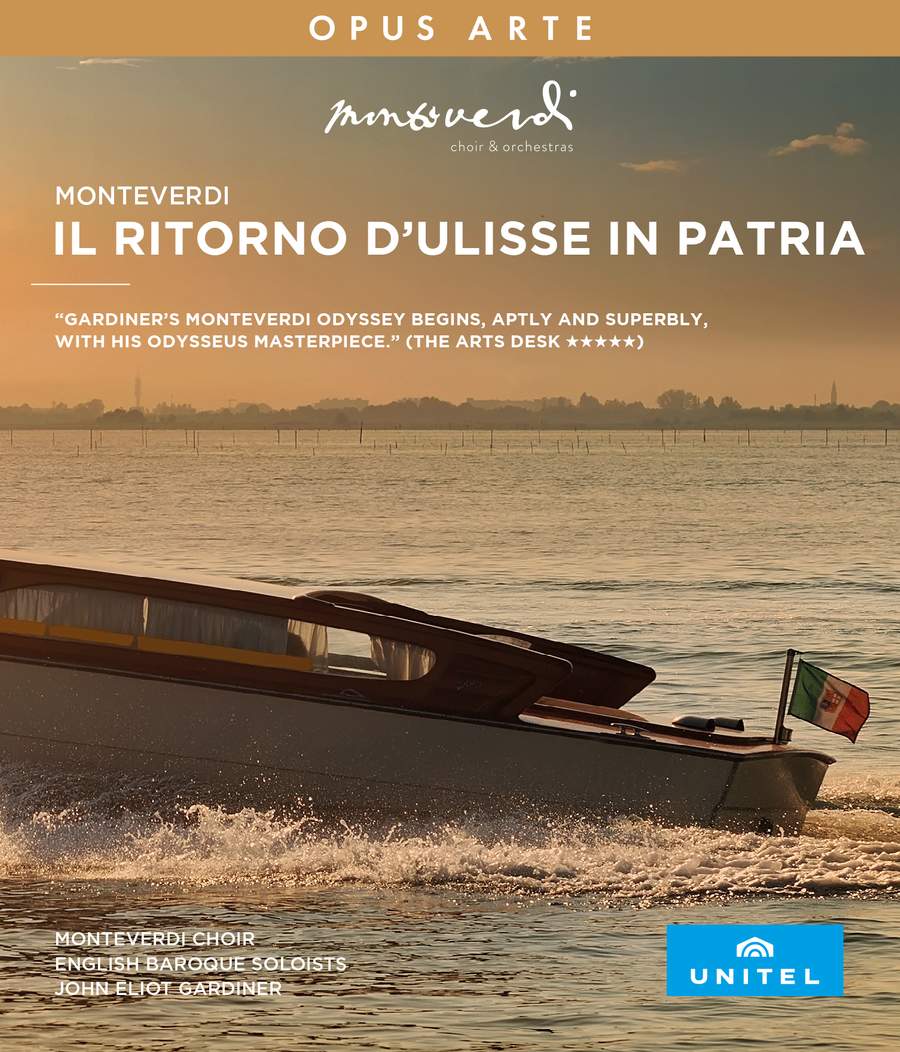MONTEVERDI Orfeo; Il ritorno d’Ulisse in patria; L’incoronazione di Poppea (Gardiner)
View record and artist detailsRecord and Artist Details
Genre:
Opera
Label: Opus Arte
Magazine Review Date: AW22
Media Format: Digital Versatile Disc
Media Runtime: 192
Mastering:
DDD
Catalogue Number: OA1346D

Tracks:
| Composition | Artist Credit |
|---|---|
| (L')Incoronazione di Poppea, '(The) Coronation of Poppea' |
Claudio Monteverdi, Composer
Anna Dennis, Drusilla; Virtue; Pallade, Soprano Carlo Vistoli, Ottone, Countertenor English Baroque Soloists Francesca Boncompagni, Damigella, Soprano Furio Zanasi, Soldier; Liberto, Baritone Gareth Treseder, Famigliari, Tenor Gianluca Burrato, Seneca, Bass Hana Blazikovà, Poppea; Fortuna, Soprano John Eliot Gardiner, Conductor John Taylor Ward, Mercurio; Littore, Baritone Kangmin Justin Kim, Nerone, Countertenor Lucile Richardot, Arnalta; Venere, Contralto Marianna Pizzolato, Ottavia, Mezzo soprano Michał Czerniawski, Nutrice, Countertenor Monteverdi Choir Robert Burt, Soldier, Tenor Silvia Frigato, Amore; Valetto, Soprano Zachary Wilder, Lucano, Tenor |
Genre:
Opera
Label: Opus Arte
Magazine Review Date: AW22
Media Format: Digital Versatile Disc
Media Runtime: 119
Mastering:
DDD
Catalogue Number: OA1347D

Tracks:
| Composition | Artist Credit |
|---|---|
| (L')Orfeo |
Claudio Monteverdi, Composer
Anna Dennis, Nymph, Soprano English Baroque Soloists Francesca Boncompagni, Proserpina, Soprano Francisco Fernández-Rueda, Shepherd, Tenor Furio Zanasi, Apollo, Baritone Gareth Treseder, Shepherd; Spirit; Eco, Tenor Gianluca Burrato, Plutone; Caronte, Bass Hana Blazikovà, La Musica; Euridice, Soprano John Eliot Gardiner, Conductor John Taylor Ward, Shepherd; Spirit, Baritone Kangmin Justin Kim, Speranza, Countertenor Krystian Adam, Orfeo, Tenor Lucile Richardot, Messenger (Silvia), Contralto Michał Czerniawski, Shepherd, Countertenor Monteverdi Choir Zachary Wilder, Spirit, Tenor |
Genre:
Opera
Label: Opus Arte
Magazine Review Date: AW22
Media Format: Digital Versatile Disc
Media Runtime: 195
Mastering:
DDD
Catalogue Number: OA1348D

Tracks:
| Composition | Artist Credit |
|---|---|
| (Il) Ritorno d'Ulisse in Patria |
Claudio Monteverdi, Composer
Anna Dennis, Melanto, Soprano Carlo Vistoli, Human Frailty, Countertenor English Baroque Soloists Francesca Biliotti, Ericlea, Mezzo soprano Francesca Boncompagni, Giunone, Soprano Francisco Fernández-Rueda, Eumete, Tenor Furio Zanasi, Ulisse, Baritone Gareth Treseder, Anfinomo, Tenor Gianluca Burrato, Tempo; Nettuno; Antinoo, Bass Hana Blazikovà, Minerva; Fortune, Soprano John Eliot Gardiner, Conductor John Taylor Ward, Giove, Baritone Krystian Adam, Telemaco, Tenor Lucile Richardot, Penelope, Contralto Michał Czerniawski, Pisandro, Countertenor Monteverdi Choir Robert Burt, Iro, Tenor Silvia Frigato, Amore, Soprano Zachary Wilder, Eurimaco, Tenor |
Author: David Vickers
In 2017 the trilogy of Monteverdi’s operas was toured on both sides of the Atlantic by John Eliot Gardiner and the English Baroque Soloists. Between June 16 and 21 each opera was performed twice at Venice’s La Fenice. The ‘staged-concert’ productions devised by Gardiner and Elsa Rooke were filmed and streamed online for a limited time, and are now issued physically by Opus Arte.
A cast of about 16 sings all three operas, with pragmatic rotation for the heaviest lifting. The choruses are sung by the cast, reinforced by five men from the Monteverdi Choir. The only surviving manuscript score of Ulisse has cues for choruses but no music; Gardiner shrewdly uses excerpts from Monteverdi’s Scherzi musicali (for the doomed Phaeecian sailors in Act 1); parts of the ballo Tirsi e Clori for the obsequious suitors’ attempt to charm Penelope; and their ill-fated attempts to string Ulisse’s bow is accompanied by a sinfonia from Ballo delle ingrate.
Gardiner fields essentially the same orchestra in all three works – the large band Monteverdi asks for in his printed edition of Orfeo: a five-part string band, pairs of recorders and cornetti, and a big continuo group. Trumpets and trombones appear exclusively in Orfeo. Gardiner uses recorders and cornetti in Ulisse and Poppea to enrich string sinfonias and ritornellos, but the majority of the sung action is declaimed with colourful support from the basso continuo team. The English Baroque Soloists are grouped on each flank of the forestage, Gardiner himself front and centre. He conducts every single bar, even simple recitative passages. His personal vision ensures a firm control over the pacing of the drama, moulding of musical phrases, shaded declamations of the text and theatrically compelling characterisations. Even if other performances can encourage a touch more musical spontaneity and collective democracy, nothing here has been left to chance.
This fastidiously micromanaged approach works best in the two late Venetian operas. The manipulated articulation of over-interpreted set pieces in Orfeo tends to be less persuasive. Maybe the musicians could have been left to fend for themselves more independently, striving for more relaxed maintenance of tactus and unaffected cadences. Hana Blažíková sings La Musica’s prologue with deftly stylish eloquence. The assorted shepherds, nymphs and spirits are vocally a touch uneven, but Krystian Adam is an ardent Orfeo and the underworld scene between Proserpina and Plutone is sung touchingly by Francesca Boncompagni and Gianluca Burrato (also a superb Caronte). The show is stolen by Lucile Richardot’s mesmerising Messenger, draped in a crimson hooded costume – a stark contrast to the simplicity of the pastoral-costumed wedding guests and the yellow-jacketed Orfeo (in all three productions, the elegant simplicity of costumes is highly effective).
Gardiner and Rooke’s conception for Ulisse is simple, direct and subtle. Richardot captures Penelope’s loneliness and constrained emotions, her guarded conversations with the loathsome suitors and fury at Telemaco’s foolish praise of Helen of Troy’s beauty, and her struggle to trust that her husband has at long last returned. Furio Zanasi is a world-weary yet dignified Ulisse, humble during his meeting with Blažíková's alert Minerva, and quietly confident during his homecoming trials. The naive lovers Melanto and Eurimaco are portrayed with delightful ease by Anna Dennis and Zachary Wilder. Francisco Fernández-Rueda’s faithful shepherd Eumete is sweetly articulate, and his antithesis Iro is acted with stinging bluntness by Robert Burt. The suitors are brought to life with distinctive personalities: Burrato’s Antinoo is the ringleader, a bullying menace capable of silver-tongued charm; Gareth Treseder’s Anfinomo is smarmy; Micha Czerniawski’s Pisandro is a wimp. The only props are Ulisse’s long shabby coat, and Iro’s bag of steak-flavour McCoys and large cup of Coca-Cola. A physical bow would have been useful at the end of Act 2, although Gardiner and Rooke’s solution is ingenious: Richardot’s tense Penelope is herself the unyielding bow; after the over-confident suitors fail to force her outstretched arms together, the disguised Ulisse stands behind her and his gentle embrace brings her hands over her heart (her shock is palpable).
The lack of a few basic props causes some mild incongruities in Poppea. Ottone’s attempted murder of the anti-heroine needs a dagger to be dropped on stage as he flees rather than Drusilla’s flimsy scarf. However, even without a bed to languish upon in their first scene together, the salaciousness of Kangmin Justin Kim’s non-binary Nerone and the postcoital deviousness of Blažíková's power-thirsty Poppea is abundantly clear. Carlo Vistoli’s Ottone is a crestfallen stooge but his intervention to save the courageous Drusilla (sung marvellously by Dennis) has vivid desperation. Silvia Frigato is a mischievous Amore and sings with pealing fluency in Valetto’s duet with Boncompagni’s flirtarious Damigella. Wearing a black professorial robe over his schoolmaster suit, Burrato’s commanding performance in Seneca’s dispute with the despotic Nerone about principles of law, moral leadership, justice and wisdom presents an age-old political dilemma that remains uncomfortably on-topic in 2022. Arnalta’s slumber aria is sung beguilingly by Richardot. Marianna Pizzolato’s fearsome demeanour as Ottavia makes Nerone’s infidelity not merely understandable but inevitable, and her cruelty to Ottone makes her eventual exile less pitiable than usual. The final duet for Nerone and the newly crowned Poppea is presented astutely as the triumph of decadent amorality.
Discover the world's largest classical music catalogue with Presto Music.

Gramophone Digital Club
- Digital Edition
- Digital Archive
- Reviews Database
- Full website access
From £8.75 / month
Subscribe
Gramophone Full Club
- Print Edition
- Digital Edition
- Digital Archive
- Reviews Database
- Full website access
From £11.00 / month
Subscribe
If you are a library, university or other organisation that would be interested in an institutional subscription to Gramophone please click here for further information.




